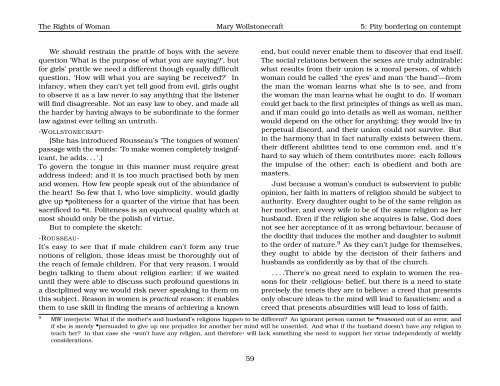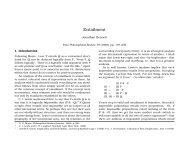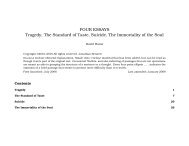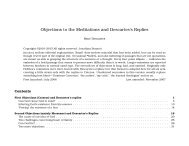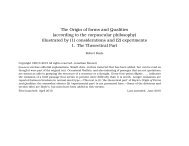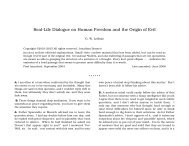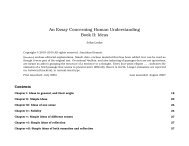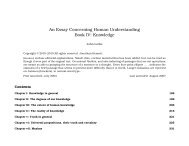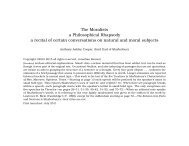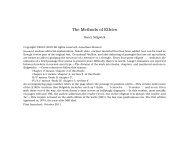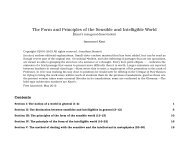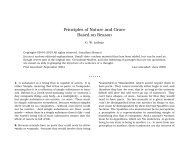A Vindication of the Rights of Woman with - Early Modern Texts
A Vindication of the Rights of Woman with - Early Modern Texts
A Vindication of the Rights of Woman with - Early Modern Texts
Create successful ePaper yourself
Turn your PDF publications into a flip-book with our unique Google optimized e-Paper software.
The <strong>Rights</strong> <strong>of</strong> <strong>Woman</strong> Mary Wollstonecraft 5: Pity bordering on contempt<br />
We should restrain <strong>the</strong> prattle <strong>of</strong> boys <strong>with</strong> <strong>the</strong> severe<br />
question ‘What is <strong>the</strong> purpose <strong>of</strong> what you are saying?’, but<br />
for girls’ prattle we need a different though equally difficult<br />
question, ‘How will what you are saying be received?’ In<br />
infancy, when <strong>the</strong>y can’t yet tell good from evil, girls ought<br />
to observe it as a law never to say anything that <strong>the</strong> listener<br />
will find disagreeable. Not an easy law to obey, and made all<br />
<strong>the</strong> harder by having always to be subordinate to <strong>the</strong> former<br />
law against ever telling an untruth.<br />
·WOLLSTONECRAFT·<br />
[She has introduced Rousseau’s ‘The tongues <strong>of</strong> women’<br />
passage <strong>with</strong> <strong>the</strong> words: ‘To make women completely insignificant,<br />
he adds. . . ’.]<br />
To govern <strong>the</strong> tongue in this manner must require great<br />
address indeed; and it is too much practised both by men<br />
and women. How few people speak out <strong>of</strong> <strong>the</strong> abundance <strong>of</strong><br />
<strong>the</strong> heart! So few that I, who love simplicity, would gladly<br />
give up •politeness for a quarter <strong>of</strong> <strong>the</strong> virtue that has been<br />
sacrificed to •it. Politeness is an equivocal quality which at<br />
most should only be <strong>the</strong> polish <strong>of</strong> virtue.<br />
But to complete <strong>the</strong> sketch:<br />
·ROUSSEAU·<br />
It’s easy to see that if male children can’t form any true<br />
notions <strong>of</strong> religion, those ideas must be thoroughly out <strong>of</strong><br />
<strong>the</strong> reach <strong>of</strong> female children. For that very reason, I would<br />
begin talking to <strong>the</strong>m about religion earlier; if we waited<br />
until <strong>the</strong>y were able to discuss such pr<strong>of</strong>ound questions in<br />
a disciplined way we would risk never speaking to <strong>the</strong>m on<br />
this subject. Reason in women is practical reason: it enables<br />
<strong>the</strong>m to use skill in finding <strong>the</strong> means <strong>of</strong> achieving a known<br />
end, but could never enable <strong>the</strong>m to discover that end itself.<br />
The social relations between <strong>the</strong> sexes are truly admirable:<br />
what results from <strong>the</strong>ir union is a moral person, <strong>of</strong> which<br />
woman could be called ‘<strong>the</strong> eyes’ and man ‘<strong>the</strong> hand’—from<br />
<strong>the</strong> man <strong>the</strong> woman learns what she is to see, and from<br />
<strong>the</strong> woman <strong>the</strong> man learns what he ought to do. If woman<br />
could get back to <strong>the</strong> first principles <strong>of</strong> things as well as man,<br />
and if man could go into details as well as woman, nei<strong>the</strong>r<br />
would depend on <strong>the</strong> o<strong>the</strong>r for anything; <strong>the</strong>y would live in<br />
perpetual discord, and <strong>the</strong>ir union could not survive. But<br />
in <strong>the</strong> harmony that in fact naturally exists between <strong>the</strong>m,<br />
<strong>the</strong>ir different abilities tend to one common end, and it’s<br />
hard to say which <strong>of</strong> <strong>the</strong>m contributes more: each follows<br />
<strong>the</strong> impulse <strong>of</strong> <strong>the</strong> o<strong>the</strong>r; each is obedient and both are<br />
masters.<br />
Just because a woman’s conduct is subservient to public<br />
opinion, her faith in matters <strong>of</strong> religion should be subject to<br />
authority. Every daughter ought to be <strong>of</strong> <strong>the</strong> same religion as<br />
her mo<strong>the</strong>r, and every wife to be <strong>of</strong> <strong>the</strong> same religion as her<br />
husband. Even if <strong>the</strong> religion she acquires is false, God does<br />
not see her acceptance <strong>of</strong> it as wrong behaviour, because <strong>of</strong><br />
<strong>the</strong> docility that induces <strong>the</strong> mo<strong>the</strong>r and daughter to submit<br />
to <strong>the</strong> order <strong>of</strong> nature. 9 As <strong>the</strong>y can’t judge for <strong>the</strong>mselves,<br />
<strong>the</strong>y ought to abide by <strong>the</strong> decision <strong>of</strong> <strong>the</strong>ir fa<strong>the</strong>rs and<br />
husbands as confidently as by that <strong>of</strong> <strong>the</strong> church.<br />
. . . .There’s no great need to explain to women <strong>the</strong> reasons<br />
for <strong>the</strong>ir ·religious· belief, but <strong>the</strong>re is a need to state<br />
precisely <strong>the</strong> tenets <strong>the</strong>y are to believe: a creed that presents<br />
only obscure ideas to <strong>the</strong> mind will lead to fanaticism; and a<br />
creed that presents absurdities will lead to loss <strong>of</strong> faith.<br />
9 MW interjects: What if <strong>the</strong> mo<strong>the</strong>r’s and husband’s religions happen to be different? An ignorant person cannot be •reasoned out <strong>of</strong> an error, and<br />
if she is merely •persuaded to give up one prejudice for ano<strong>the</strong>r her mind will be unsettled. And what if <strong>the</strong> husband doesn’t have any religion to<br />
teach her? In that case she ·won’t have any religion, and <strong>the</strong>refore· will lack something she need to support her virtue independently <strong>of</strong> worldly<br />
considerations.<br />
59


